LIBRETTO

LUCIA DI LAMMERMOOR Q&A
For the Soprano Ashley Milanese, the Best Way to Learn is by Doing
INTERVIEW BY MARINA HARSS
This winter, in her first appearance in Sarasota, the soprano Ashley Milanese took on the role of Lucia in Gaetano Donizetti’s drama Lucia di Lammermoor
It is a notoriously taxing role, vocally and dramatically, requiring both strong bel canto technique, but also the intensity and stamina to pull off a twenty-minute mad scene worthy of the great stage actresses of legend. For Milanese, who performed in Sarasota for the first time, it was the latest challenge in what is already a burgeoning career. A graduate of the Curtis Institute of Music in Philadelphia, she has sung with Opera Philadelphia, Komische Oper Berlin, and was an artistin-residence at the Teatro Regio di Torino before and during the pandemic. Soon after her début as Lucia in Sarasota, she will be tackling another role she has long aspired to, Mimi in La bohème, at Opera in the Heights in Houston.
I recently caught up with Ashley at home in New Orleans, to which she recently returned after living in Europe for four years.
How did you prepare to sing Lucia? What were the challenges?
It is a very substantial role; she’s there almost the entire time. And all of her singing is pretty demanding. She sits in the passaggio [the transition between lower and higher vocal registers] quite a bit and then she extends upward sometimes. And there’s quite a bit in the lower register. Many singers add in a lot of high notes. One of the things that I’m still wrapping my head around is the fact that the role is so iconic. I didn’t want to disappoint the audience.
Do you have a favorite version that you go back to?
That’s a difficult question. Someone I listen to a lot is Renata Scotto.
How did you figure out your approach to singing the mad scene?
I watched every single person who’s ever done that scene to figure out what makes each one different, and what people tend to do the same way. There are so many performance practices that are actually not written in the score, not only the cadenzas but also timing, slowing the tempo down or going twice as fast at random moments. It’s almost this secret code that every Lucia is supposed to know. That has been really fascinating. And I tried to sing it a million times. I tried to sing through the whole show at least twice a week with a pianist.
And how about dramatically?
My experience so far is that I learn a lot about the character in rehearsals. The director will give me ideas, and it all starts to become more clear. But I’ve playing with it on my own as well and seeing what I want to do dramatically. I have to work out the pacing because it’s a twenty-minute scene and if it’s too generic, it gets boring really fast. So I’ve been trying to map out places where I want to hold back a little so I can give more later. It’s better when the audience doesn’t get everything right away.
How did you get started in opera?
It all started when I was 11 or 12, almost accidentally. I was always performing and putting shows for my family. Then I went to a school that held a Christmas concert every year, and I told the music teacher that I had heard an excerpt of the Queen of the Night

aria from The Magic Flute. And I said, “yeah, I could probably sing along with that.” And he laughed. So I started singing, and he couldn’t believe it. He said I sounded like an opera singer. So he put me in the Christmas concert and gave me a big solo. My parents and a bunch of people came. It was like an out of body experience, for me and for everyone. No-one could quite understand what had just happened. And from that moment, opera is the thing I have to do with my life.
Where did you train?
I went to an arts high school here in New Orleans with a small opera program, and studied with the soprano Phyllis Treigle, and then, right after high school, I went to Juilliard. For my last year, I transferred to Curtis in Philadelphia, because it’s really small and you have a sponsor supporting all of your studies. The main difference for me was that Curtis had a motto of “learn by doing,” and I was looking for that kind of experience.
SARASOTA OPERA | LIBRETTO 1
WINTER 2024 | ISSUE 158 CONTINUED ON PAGE 5
Sarasota Opera Celebrates 20 Years with Young Bok Kim
BY RICHARD RUSSELL
Every year, one of my favorite moments in the Sarasota Opera season, is the annual return of bass Young Bok Kim. He is a familiar and welcome presence to our audiences, and for us a valued company member and friend. This season we celebrate twenty seasons with Young Bok Kim, as he returns in the role of Raimondo in Lucia di Lammermoor.
Young Bok made his debut with Sarasota Opera in the role of Sarastro in Mozart’s The Magic Flute in 2004. He has been with us for nearly every season since, absent only from the 2008, 2009, and 2021 (COVID) Winter Opera Festivals. He has also joined us for several fall opera productions. His unctuous Don Basilio in The Barber of Seville has been with us twice (and will return next season). He has also been an important part of some of our Verdi productions including I masnadieri, Jérusalem, Rigoletto, Attila, Don Carlos, and Aida. He has even taken an occasional cameo role in a season when a suitable lead was not available, illuminating any part that he takes on no matter how small. And of course we just love having him around.
Among his roles with Sarasota Opera have been some of the most evil characters in opera, including the assassin Sparafucile in Rigoletto (Fall 2012) and the murderous
warrior Attila (twice, in 2008 and 2022). Which is odd, since Young Bok is one of the nicest people you’ll ever meet. Modest, unassuming, he has a warm and dignified presence, with a sly sense of humor. He is devoted to his family and takes great pride in the achievement of his children. Young Bok is also one of the hardest workers in the company with a serious approach to his work and a determination to give our audiences his very best.
One of our favorite pastimes with Young Bok over the years has been to explore Korean cuisine. He comes from a family who have operated restaurant in his hometown of Seoul and can always be counted on to find the best places for Korean food, in the New York City area, where he lives with his family, or in Sarasota. Members of the company have also benefited from his culinary expertise on occasion and Mo. DeRenzi always anticipates Young Bok’s return and a delivery of kimchi. There can be no doubt that our audiences appreciate his great talent. It is gratifying to hear the warm cheers for him at each curtain call which recognize not only another wonderful performance, but the deep affection that Sarasota Opera audiences have for him.
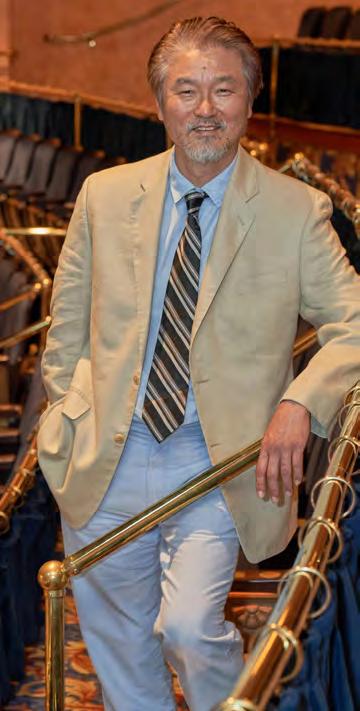
Marco: Onstage and Behind the Scenes
Marco Nisticò has played many roles at Sarasota Opera, from singer to artistic administrator to stage director. His first contact with the company came in 2008, when he sang the role of Doge Francesco Foscari in Verdi’s 1844 opera due Foscari. He came back often, appearing in both comic roles—Dulcamara in Donizetti’s L’elisir d’amore was a particular favorite—and serious ones, including Rodrigue in Verdi’s Don Carlos and Rigoletto in the eponymous opera, also by Verdi. In 2020, after retiring from singing, he directed his first opera here, returning to a work he knew inside and out, L’elisir d’amore. And in 2021, he became the company’s artistic administrator, in other words the person whose job it is to ensure that everything runs smoothly, from auditions to rehearsals to contract negotiations, as well as everything else that goes on behind the scenes. This season, he returned to his role as stage director, this time of a Haydn opera, L’infedeltà delusa (Deceit Outwitted).
caught up with Marco recently and we spoke a bit about opera, his connection to Sarasota, and the pleasures of Haydn.
my colleagues who are part of the creative team (costumes, wig and makeup, scenery, lighting etc.). I have an idea of how to tell the story, but I enjoy seeing it transformed and brought to life by all the people who are part of the production.
You directed Haydn’s L’infedeltà delusa in the 2024 winter season. How would you describe the opera?
It’s an elegant comedy. The music is beautiful and the action flows with ease. There are many opportunities for the singers to shine vocally but also as actors, mostly as comic actors. There are disguises and some clever jokes in the libretto. It’s a delightful piece, rarely performed, and I am sure the audience enjoyed the opportunity to see it here.
Have you ever sung Haydn?
Just once, in his opera Il mondo della luna, a very funny piece about a man who believes he travels to the moon. It was a fun production, because we performed it at the Planetarium in New York City. And Lou Reed, of the Velvet Underground was in the audience!
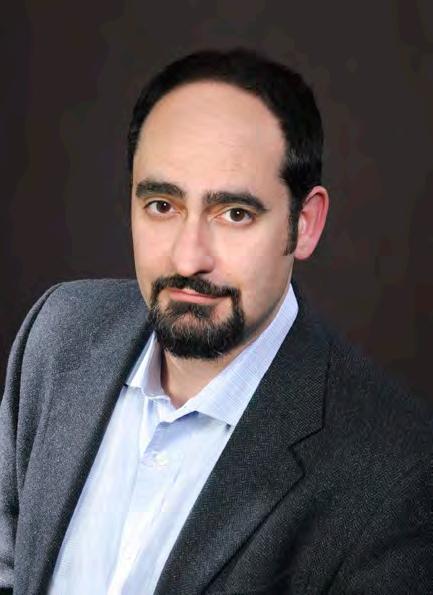
of production. Always in communication with Maestro DeRenzi about all aspects of the production. We don’t want anything to distract from the story or the style of the opera.
What is the most interesting aspect of the process of bringing an opera to the stage, for you?
Gayle Williams ~ The Observer
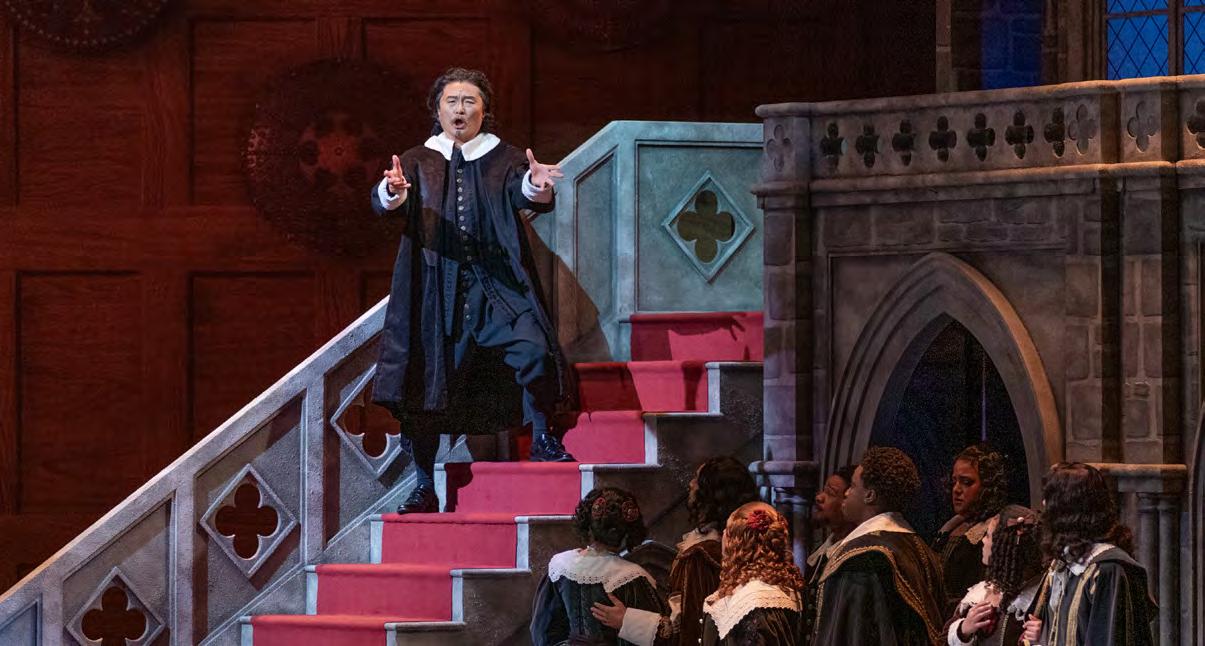
You have been Artistic Administrator at Sarasota Opera since 2021, but your history with the company goes back much further. What do you remember about your first season in Sarasota? sang the role of Doge Foscari in Verdi’s I due Foscari. That was also my first leading Verdi role. I did a lot of preparation, and read a lot about the period. happened to travel to Venice around that time, and did some research there into the iconography of the doges, as the rulers of the Venetian Republic were called. The role was a big challenge, but learned a lot.
What were some of the highlights of your performance career here in Sarasota? Other than Foscari, some of my favorite roles here have been: Germont in La traviata, Rodrigue in Don Carlos, and certainly Rigoletto. As a baritone, was never the romantic lead! All of those operas are by Verdi, and they were all were all debut roles for me. The company has such a strong connection to Verdi, so was happy to sing them here.
You’ve also directed an opera here, L’elisir d’amore in 2020. What do you love about directing?
love the collaboration with the artists and all
Amazing! For once it was you onstage instead of him. What did Sarasota’s production of L’infedeltà look like?
It was bucolic and elegant. The opera is set in a small village somewhere in Tuscany, with countryside all around. It’s a comedy, but we need to keep in mind that the humor of the time was not “slapstick” and broad but more delicate, with the exception perhaps of a brief drinking song. The “lieto fine” (happy ending) is de rigueur in this type of opera, and these days we all need something to lift our spirits, don’t we?
What is the music like?
It’s reminiscent of Mozart, though a bit less “dramatic.” Mozart loved and respected Haydn. The music tells the story very well and it’s also highly pleasurable to listen to.
How do you prepare to direct an opera?
What comes first?
First, I study the story and the libretto, or text. After that I start studying the music. I listen to it a lot, and I study the score closely, just as did when was a singer preparing a role. Then start to imagine some ideas for staging, situations, entrances and exits, technical things. I also discuss what the production will look like with the set designer, lighting designer, props coordinator, and our director
Perhaps it is seeing how each singer-actor interprets what I ask them to do, how they shape my vision of each scene and the arc of their character. I want them to have ideas, to be creative. Then I help them to fit their interpretations into the overall narrative and style of the production.
You were a singer, so you must have a special understanding of singers. What do you feel that singers need from directors?
In my experience singers need to be guided when it comes to the “blocking,” or movement onstage. They need help finding ways to express what they want to say about their character. usually have a specific idea of what each character’s intention is in each scene. But also want to know the singers’ take on the scene, the aria, the recitativo or ensemble. People want to feel they are creating a role. don’t want to impose myself, and if sometimes we disagree on the direction of a scene, it’s my job to convince them of my take… they have to make it work and believe in it.
Do you have a directorial “philosophy”?
Tell the story. Respect the music and the text. A lot has been decided by the composer. try to figure out what the composer wanted to express. I don’t need to superimpose my own “concept,” or reinvent the story. I am an interpreter. That’s where my creativity lies.
OPERA LIBRETTO 3
SARASOTA
OPERA | LIBRETTO 2
SARASOTA
INTERVIEW BY MARINA HARSS
CONTINUED ON PAGE 5
DELUSA Q&A
Young Bok Kim as Raimondo in Lucia di Lammermoor.
L’INFEDELTÀ
Photo: Rod Millington
Young Bok Kim masterfully conveys a complexity of emotions in the depth of his voice.
Introducing: Vladyslav Buialskyi
INTERVIEW BY MARINA HARSS
This year, Sarasota presented Giuseppe Verdi’s Luisa Mille r, an opera based on a drama by the 18th century German poet and playwright Friedrich von Schiller. As in so many operas, Luisa Miller’s plot hinges on a love triangle gone bad. One of the characters is a malicious count, Count Walter, who killed his cousin in order to secure his title. The role was sung by the young Ukrainian bass Vladyslav Buialskyi, only 26, who recently finished a stint in the Lindemann Young Artist Development Program at the Metropolitan Opera. During his time there he made his début on the Met stage, in Verdi’s Don Carlo, and he has since sung Leporello in Don Giovanni at the Opéra de Lille. Buialskyi was born in Berdyansk, a city on the Sea of Azov in southern Ukraine. He trained in the state conservatory in Kyiv. This was his first appearance with Sarasota Opera.
We spoke recently before a rehearsal.
How did you discover that you had a good voice?
Even when was little when I would watch TV with my grandma would sit in my little chair and start to sing along. Then I started singing in a chorus and learning some solo music. But liked all kinds of music, not necessarily opera. think started to realize I liked opera, and that that was the right path for me, when I was about 17.
What did you do then?
When was in my last year of high school, had a conversation with a close family friend, a man who I think of as my uncle. His wife is a mezzo soprano at the Kyiv Opera House. And his sister was my teacher in chorus classes at school. He told me that had talent, and that should go to conservatory, and that he would help me. was still 17, so when auditioned, the conservatory said I was too young, so I went to the music college for two years, and after that went to conservatory. After taking part in the Moniuszko Competition in Warsaw, got the call from the Lindemann program.
How did you find out you had gotten into the Lindemann program?
was so shocked because one day, when was at the conservatory standing around with my friends, got a message from Sophie Joyce, who was the director of the program at the time. She said they wanted to hear me. The idea of going to America was a bit scary
for me to be honest because at the time had only traveled outside of Ukraine three times, to Zurich, to the Moniuszko Competition in Poland, and to Azerbaijan. America is so far away, so far from my home, and I am a person who gets homesick. I really miss home, especially nowadays. But it helped that there was another Ukrainian singer there as well, Valentina Pluzhnikova. She helped me so much with day-to-day things. And also Meredith LaBouff, the assistant director. You can’t even imagine how many stupid questions I asked, and I’m grateful for their help and patience
Who are your operatic heroes?
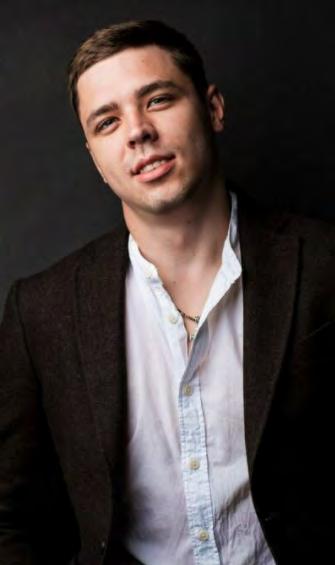
Muslim Mahomayev, from Azerbaijan, was a huge star in Soviet times. love him so much. My transition from pop to classical music started because of him. My mother encouraged me to listen to him. loved his voice, his technique. He sang everywhere, at all the big events in the Soviet Union. He was even a guest at La Scala. And he was a baritone. Then, once started to get into opera, fell in love with Nicolai Ghiaurov, Cesare Siepi, Samuel Ramey. As well as a Ukrainian singer, not so famous, Boris Hmyria.
This season, you’re singing Conte di Walter in Verdi’s Luisa Miller. How do you like the role? It’s your first big Verdi role, isn’t it?
Yes. Verdi is a challenge. I’m really grateful that this role has helped me to find a stable way of healthy singing. I want to find a balanced and really natural way to portray the character. This is my first bad guy, and my second big role, after Leporello in Don Giovanni at Opéra de Lille last fall.
How has it been working with Maestro DeRenzi?
I’m really enjoying it…he knows so much, and he really knows what he wants. He’s a Verdi specialist. And find that most of the time, the things he asks for, had instinctually felt wanted to do the same thing. So it makes sense.
What’s next for you after Sarasota? have a Beethoven Ninth concert in Pittsburgh. Then I have Benvenuto Cellini in Dresden.
SOPRANO ASHLEY MILANESE
CONTINUED FROM PAGE 1
What led you to go to Europe?
While was at Curtis, started working with Opera Philadelphia, which had an emerging artists program, and that allowed me to make a lot of small professional debuts and be in a real house versus a school environment. I also got my Masters there, as well as my artist’s diploma, in 2018. After that went to the Teatro Regio in Torino through a scholarship was awarded through the Opera Foundation Competition. After that first year, the theater hired me directly, contract to contract.
What did you sing while you were in Torino?
was basically a part of every production that was happening there, it didn’t matter whether it was a small role or a more significant one. It ranged from Inez in Trovatore to Lisa in La sonnambula who has two arias; and a ton of Gianetta in L’elisir d’amore
Do you recommend that young singers have that experience of singing a bunch of smaller roles with a European house? For me it was the best type of real-world experience, and it also helped me figure out my singing. You’re really learning by doing. You find out quickly how things feel, what
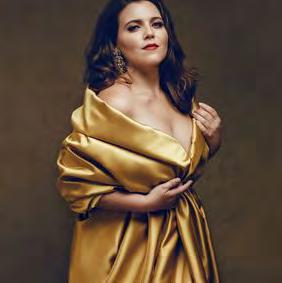
caliber and standard you have to achieve. really recommend it. For the language as well.
You recently moved back to your home town, New Orleans. What do you love about it?
There’s a lot to love actually. The food, the people, and the culture in general. I feel like it’s not an American city, which is interesting. It’s its own thing. A lot of Europeans will say that it feels European even though for me it’s somewhere between European and American. It has its own culture, its own food. And the people are so kind. It’s hard to pick just one thing.
MARCO NISTICÒ
CONTINUED FROM PAGE 3
You seem to have a special affinity with comedy—what is attractive about directing operatic comedies?
Humor is such a delicate thing. You don’t want to go too far, or do too little. It’s interesting to work on those nuances with the singers, to help them find their own subtle timing and phrasing.
Why do you think so many comedies, like Don Pasquale, Barber of Seville, and La scala di seta, just to name a few, revolve around mis-matched lovers?
It’s a great device for creating funny situations. Also, think it’s a good idea to keep a sense of humor about this very emotional aspect of human life.
We live in such a turbulent, difficult times. Why does comedy matter?
Humor helps us to understand life and ourselves better; it gives us perspective and helps us laugh at our weaknesses and flaws; and it offers some lightness, and that is something we all can use.
What was your Met début, in Don Carlo, like?
sang one of the Flemish deputies. It’s an unbelievably huge stage, singing with unbelievably talented people, from the pianists to the orchestra and of course the conductors and singers and stage managers and crew. But it was tough, to be honest. had a combination of different feelings. Because just four days earlier, the Russian invasion of Ukraine had started. I was up almost all night every night, watching the news.
How is your family?
My mom is in my hometown, Berdyansk, one hour from Mariupol. And my father is in another city nearby, Melitopol. That entire territory is now under Russian control. The situation is unstable. remember my mom called me on the day of the invasion, at around five in the morning. She called me and said there were explosions. I told her, don’t worry, I’m sure they’re not really explosions. And then I heard the explosions over the phone line. It was horrible. I was so grateful to the Met because they helped and supported me and my family a lot, especially Peter Gelb, Yannick Nézet-Séguin, and Melissa Wegner, and many more people than can name. will always be incredibly grateful for that.
TRIBUTES
A gift to the Sarasota Opera Tribute Fund is a beautiful way to memorialize a loved one, honor a friend, or celebrate a special occasion. A tribute card is sent to a family member or the honoree and is published in this newsletter. This list reflects tribute gifts received through March 1, 2024. Gifts received after this date will appear in the next edition of Libretto.
IN MEMORY OF ROGER ANGELL
Margaret Moorman
IN MEMORY OF BILL ASP
Norman Gabrick
IN MEMORY OF BEBA
Catherine Batch
IN MEMORY OF DICK CATTANI
Nardyne Cattani
IN HONOR OF MARTHA COLLINS
William R. Jones
IN MEMORY OF SUSAN FINMAN
Gordon Finman
IN MEMORY OF BARNEY FITZGERALD
Sandra Piech
IN HONOR OF HANK AND MELINDA FOSTER
David W. Gallagher
IN MEMORY OF HILDE AND FRANZ FRANKL
Mark and Alice Golub
IN MEMORY OF MARY HIGGINS
Judith Gerry
IN MEMORY OF ALFRED IVERSEN
Rosemary Iversen
IN MEMORY OF EVE JOHNSTON
Wayne Johnston
IN MEMORY OF WALLY KRAEMER
James Goldfarb
Tim and Gail Harty
Robert and Barbara Luce
Barry and Leslie Mandelbaum
Dale Menard
Christoph and Sandy Ritterson
Rachel Manischewitz Rocker
Bill and Pat Rosenberg
Sandra and James Rosenberg
Gabriel and Valerie Schmergel
Toby and Noel Siegel
Kerstin White
IN HONOR OF PHYLLIS LOWITT
Temple Beth Israel of Longboat Key
IN MEMORY OF DAVID LUCE
Ramon and Maryanne Hazen
Jeanne Yeagle
Manatee Opera Guild
IN HONOR OF ROSANNE MARTORELLA
Donna Schettina
IN MEMORY OF ALICE AND EDWIN PRICE
Barbara Price
IN HONOR OF TRAVIS ROGERS
Marsha Addis
IN MEMORY OF DR. STUART AND PATRICIA SILVER
Sally Peterson
IN MEMORY OF DR. GEORGE STRASCHNOV
Victor DeRenzi and Stephanie Sundine
Colette Penn
IN HONOR OF BILL AND REBECCA
TOMPKINS
Carole Dubosky
IN MEMORY OF GREG TRUPIANO
Lon Black
IN HONOR OF DON AND RACHAEL WORTHINGTON
Jim Worthington
SARASOTA OPERA LIBRETTO 5 SARASOTA OPERA | LIBRETTO 4
LUISA MILLER
Q&A
2024 WINTER OPERA FESTIVAL

Hanna Brammer as Vespina in Deceit Outwitted is a powerhouse soprano who delights us with her voice and just as much with her comedy chops.
Gayle Williams
Mezzo-soprano Chelsea Laggan brought a fiery spirit, a condescending look and a radiant voice to her role as Carmen.
Jay Handelman, Sarasota Herald-Tribune
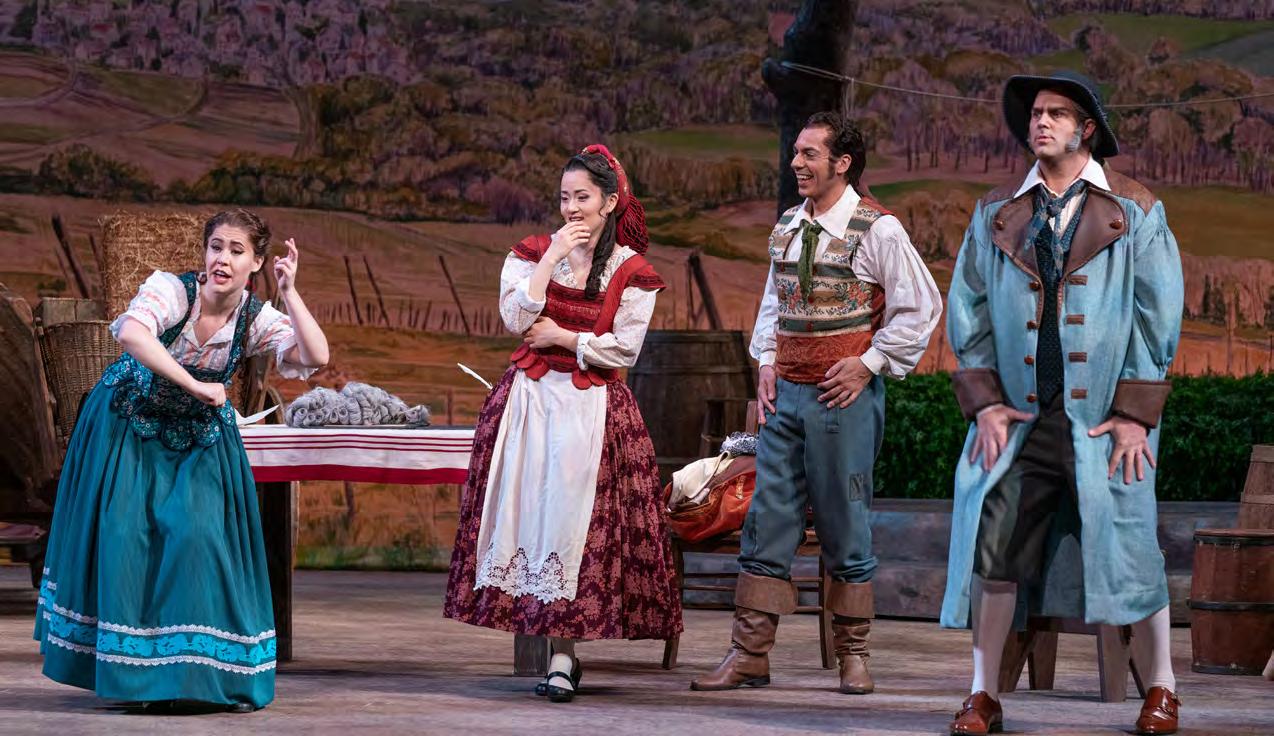
The performance of both soprano Aviva Fortunata as Luisa and tenor Rafael Dávila as Rodolfo together was an absolute pleasure.
Gayle Williams
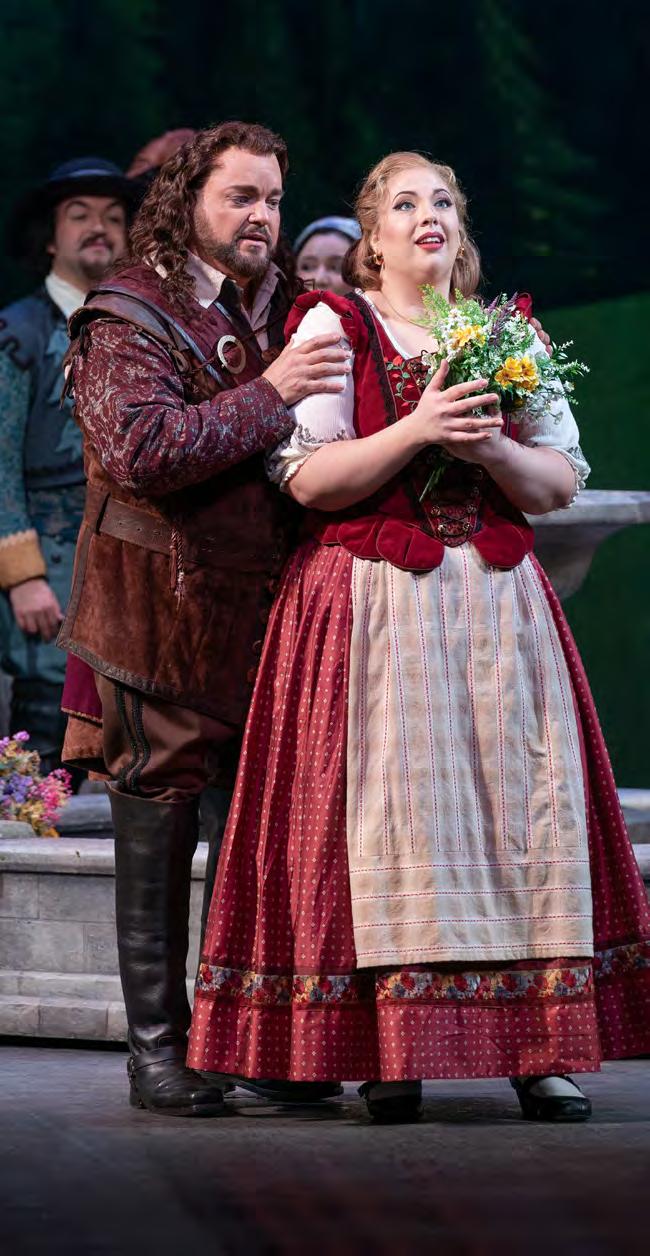
Ashley Milanese’s account of Lucia’s mad scene, a coloratura tour de force, had the audience hanging on every decorative note.
John Fleming, Opera Magazine
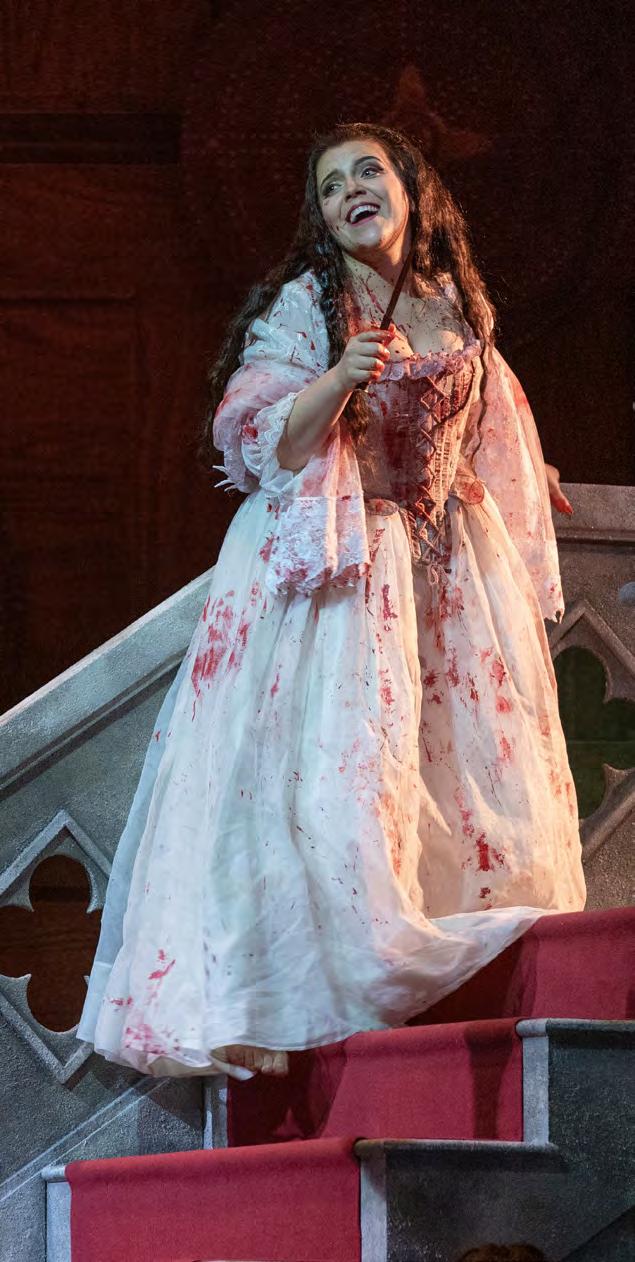
OPERA LIBRETTO 7 SARASOTA OPERA | LIBRETTO 6
SARASOTA
Photo: Rod Millington
Photo: Rod Millington
Photo: Rod Millington
Photo: Rod Millington



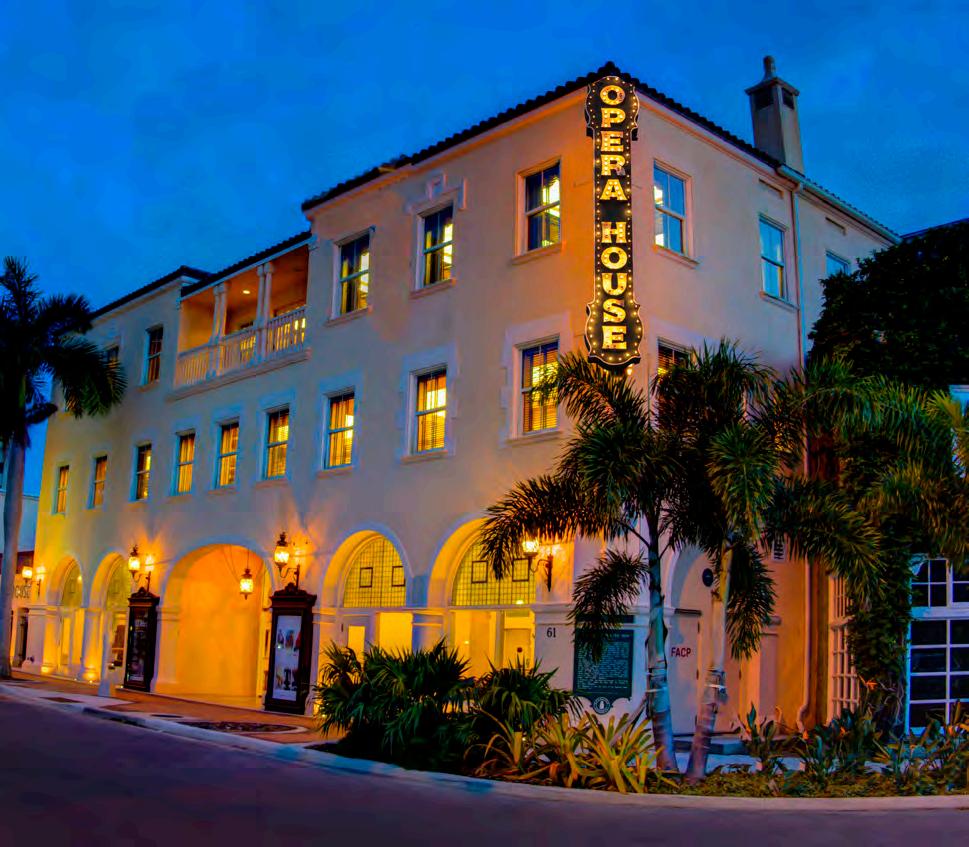
SARASOTA OPERA | LIBRETTO NEWSLETTER | WINTER 2024 | ISSUE 158 VICTOR DeRENZI Artistic Director RICHARD RUSSELL General Director 61 North Pineapple Avenue Sarasota, FL 34236 Phone: (941) 366-8450 Fax: (941) 955-5571 Info@SarasotaOpera.org www.SarasotaOpera.org SCOTT GUINN Editor 2024-25 SEASON The Hobbit™ By Dean Burry (Sarasota Youth Opera) T he Music of Giuseppe Verdi A special concert presentation Cavalleria rusticana By Pietro Mascagni AND Pagliacci By Ruggero Leoncavallo The Barber of Seville By Gioachino Rossini The Marriage of Figaro By Wolfgang Amadeus Mozart Stiffelio By Giuseppe Verdi SUBSCRIPTIONS TO THE 2024-25 SEASON ON SALE NOW Go to SarasotaOpera.org or contact the Sarasota Opera Box Office. SINGLE TICKETS TO THE 2024-25 SEASON GO ON SALE SEPTEMBER 3 BOX OFFICE HOURS: Open Monday - Friday, 10 am - 5 pm. Walk-Ins welcome. Box Office: (941) 328-1300 E-mail: boxoffice@sarasotaopera.org Fax the Box Office: (941) 955-5571 Online: SarasotaOpera.org Or mail your order form to: Sarasota Opera Box Office 61 N. Pineapple Avenue Sarasota, FL 34236












